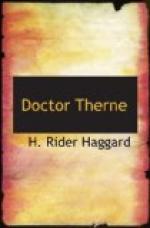Three years and more had gone by since that night on which I sat opposite to a wine-glass full of poison and was the prey of visions, when once again I received a call from Stephen Strong. With this good-hearted, though misguided man, and his amiable, but weak-minded wife, I had kept up an intimacy that in time ripened into genuine friendship. On every Sunday night, and sometimes oftener, I took supper with them, and discussed with Mrs. Strong the important questions of our descent from the lost Tribes and whether or no the lupus from which she suffered was the result of vaccination in infancy.
Owing to a press of patients, to whom I was obliged to attend, I was not able to receive Mr. Strong for nearly half an hour.
“Things are a bit different from what they used to be, doctor,” he said as he entered the room looking much the same as ever, with the exception that now even his last hairs had gone, leaving him completely bald, “there’s six more of them waiting there, and all except one can pay a fee. Yes, the luck has turned for you since you were called in to attend cobbler Samuels’ children, and you haven’t seen the top of it yet, I can tell you. Now, what do you think I have come to see you about?”
“Can’t say. I give it up.”
“Then I will tell you. You saw in yesterday’s paper that old brewer Hicks, the member for Dunchester, has been raised to the peerage. I understand he told the Government that if they kept him waiting any longer he would stop his subscription to the party funds, and as that’s 5000 pounds a year, they gave in, believing the seat to be a safe one. But that’s just where they make their mistake, for if we get the right man the Rads will win.”
“And who is the right man?”
“James Therne, Esq., M.D.,” he answered quietly.
“What on earth do you mean?” I asked. “How can I afford to spend from 1000 to 2000 pounds upon a contested election, and as much more a year in subscriptions and keeping up the position if I should chance to be returned? And how, in the name of fortune, can I be both a practising physician and a member of Parliament?”
“I’ll tell you, doctor, for, ever since your name was put forward by the Liberal Council yesterday, I have seen these difficulties and been thinking them out. Look here, you are still young, handsome, clever, and a capital speaker with a popular audience. Also you are very hard-working and would rise. But you’ve no money, and only what you earn at your profession to live on, which, if you were a member of Parliament, you couldn’t continue to earn. Well, such a man as you are is wanted and so he must be paid for.”
“No, no,” I said, “I am not going to be the slave of a Radical Five Hundred, bound to do what they tell me and vote as they like; I’d rather stick to my own trade, thank you.”
“Don’t you be in a hurry, young man; who asked you to be any one’s slave? Now, look here—if somebody guarantees every farthing of expense to fight the seat, and 1200 pounds a year and outgoings if you should be successful, and a bonus of 5000 pounds in the event of your being subsequently defeated or electing to give up parliamentary life, will you take on the job?”




